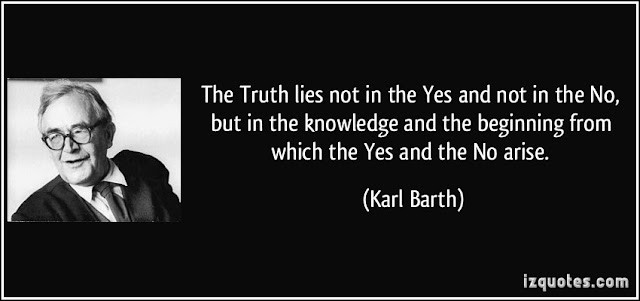We can safely claim that Calvinist Karl Barth and his mistress Charlotte Kirschbaum were able to undermine Western Christianity with a two-fold attack. He appealed to the professors with his double-talking Dogmatics, and became the official theologian of Fuller Seminary, thanks to faculty studies at Basel, Switzerland. His commentary on Romans in 1919 created a sensation, and he soon became a professor rather than a parish pastor. Thus the Centennial of Apostasy.
When various people express their awe of Barth, they either do not know or want to know about his Marxist thought or his live-in mistress, Charlotte Kirschbaum. That has been thoroughly discussed by George Hunsinger, head of the Barth Institute (Temple) at Princeton. I met Hunsinger at Yale, worked at the Yale Medical Library with his first wife, and met him again at Notre Dame.
"As his unique student, critic, researcher, adviser, collaborator, companion, assistant, spokesperson, and confidante, Charlotte von Kirschbaum was indispensable to him. He could not have been what he was, or have done what he did, without her." Hunsinger, review of the S. Seliger book, Charlotte von Kirschbaum and Karl Barth: A Study in Biography and the History of Theology.
Barth was not trained to be an academic, and he was swamped. The mysterious Charlotte Kirschbaum showed up to be his assistant and his mistress. He tried to divorce his wife Nelly, but she said "Nein! mein Schnutschi-Putschi." He lived with Charlotte during the summer and moved her into his home a bit later.
We know next to nothing about Charlotte, who was willing to work for almost nothing her entire life. She was clearly the researcher and likely the one who wrote the small print in the Dogmatics. She went with him on his trips and shared the same room when he stayed at faculty homes on his trip to America. She represented him at a major Marxist confab.
In Academics
Schleiermacher, educated at Halle University, had a major struggle with the Christian Faith, so his father's urging him to study made him a highly educated sceptic. The result was a theologian who established "faith without belief," the theologians characterized by my friend as "people with a sentimental attachment to Christianity."
Schleiermacher was ideal for those who were really rationalists but chose to remain within the Church by using their God-talk, their faith-words, to express their ideas.
Barth and Kirschbaum built upon this by created a system where the radicals could exploit their double-talk from within the institution, a far more effective position than outside of it.
Barth was the dominant theologian at Notre Dame in the 1980s. Frank Fiorenza, now at Harvard, was the president of the Barth Society at one point. He shared Barth's co-writing tactics with us. As he said, "Most of us in the Barth Society thought Charlotte wrote the fine print and he wrote the large print." For those uninitiated in Barthology, the large print was the outline of each section, written in complete sentences in a larger font. Many people extolled the fine print and the special essays in the volumes. Some of the large print sections or markers were laughable.
My main advisor for the dissertation was John Howard Yoder, who studied under Barth at Basel. This made Yoder a rock star among Mennonites. Hauerwas encouraged Notre Dame to share Yoder with Goshen College, which was not far away. Hauerwas was another advisor.
Various names are mentioned among the famous modern theologians, but Barth's was always on the list, just as much for Catholics as for Protestants. Having a major work, with 12 fat volumes, was a great way to dominate in publishing and influence.
In Church Growth
Two key figures at Fuller Seminary studied with Barth in Basel. One was the founder's son. The Battle for the Bible and its sequel deal with this. The anti-inerrancy people won, and the credit for this back-sliding was given to Barth's influence.
Fuller is not only the most influential school for Evangelicals, but also the finishing school for LCMS-WELS leaders. Those WELS-LCMS leaders who have studied there would make a glorious Wall of Shame for anyone curious about their decline. David Valleskey and Frosty Bivens are so devious that they brag about their Fuller studies to some and deny it (calling me a liar) to others.
One step removed, C. Peter Wagner earned his doctorate at Princeton, a very liberal Calvinist school, home of the Barth Society (Temple).
For WELS, LCMS, and ELCA, union with Calvinism is a nostalgic trip back to their roots. They make up 99% of registered but confused Lutherans in America. The three denominations began with a heavy dose of unionism with the Calvinists, struggled to pull away, but ran back, just like the abused children who defend their moms in court and deny the broken bones and bruises.










